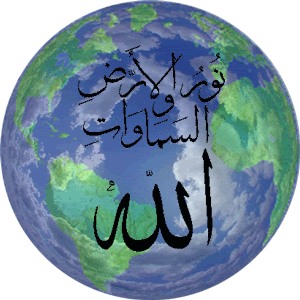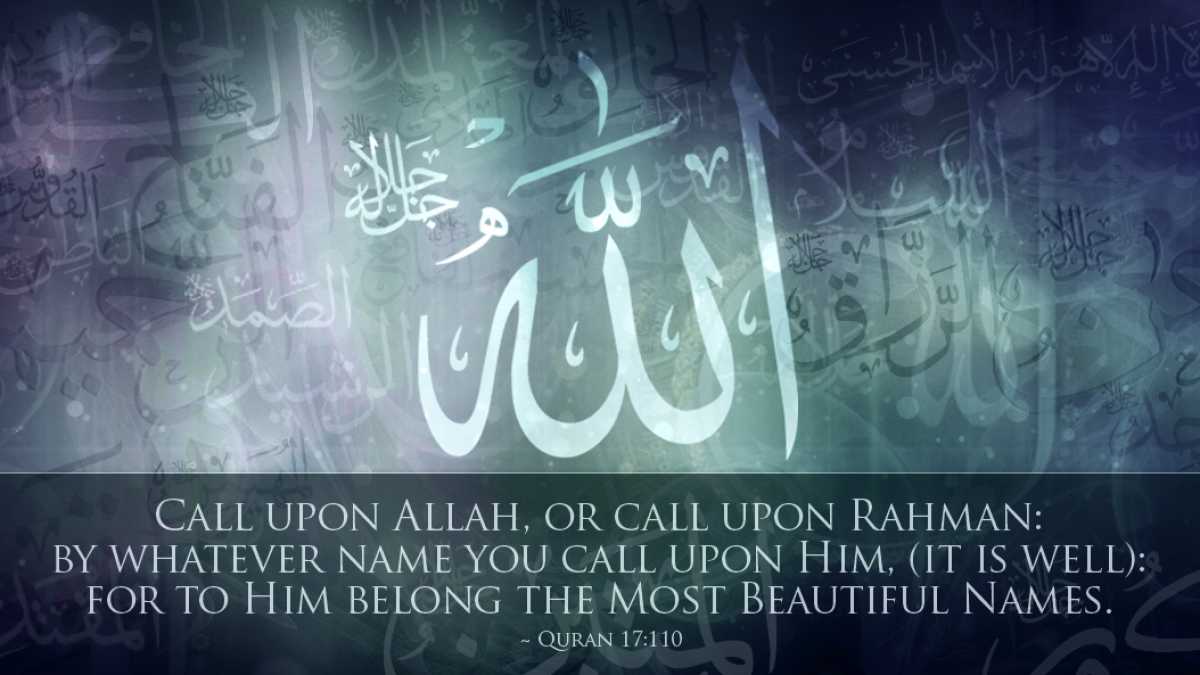




|
(1) And your ILah (God) is One ILah (God - AlLah), La iLaha ilLa Huwa (there is none who has the right to be worshipped but He), the Most Gracious, the Most Merciful. |






Say, "He is Allah, [who is] One,
Allah, the Eternal Refuge.
He neither begets nor is born,
Nor is there to Him any equivalent."
"To God (Allah) belongs 99 names"
It is a known fact that every language has one or more terms that are used in reference to God and sometimes to lesser deities. This is not the case with Allah. Allah is the personal name of the One true God. Nothing else can be called Allah. The term has no plural or gender. This shows its uniqueness when compared with the word god which can be made plural, gods, or feminine, goddess. It is interesting to notice that Allah is the personal name of God in Aramaic, the language of Jesus and a sister language of Arabic.
The One true God is a reflection of the unique concept that Islam associates with God. To a Muslim, Allah is the Almighty, Creator and Sustainer of the universe, Who is similar to nothing and nothing is comparable to Him. The Prophet Muhammad was asked by his contemporaries about Allah; the answer came directly from God Himself in the form of a short chapter of the Quran, which is considered the essence of the unity or the motto of monotheism. This is chapter 112 which reads:
"In the name of God, the Merciful, the Compassionate.
Say (O Muhammad) He is God the One God, the Everlasting Refuge, who has not begotten, nor has been begotten, and equal to Him is not anyone."
Some non-Muslims allege that God in Islam is a stern and cruel God who demands to be obeyed fully. He is not loving and kind. Nothing can be farther from truth than this allegation. It is enough to know that, with the exception of one, each of the 114 chapters of the Quran begins with the verse: "In the name of God, the Merciful, the Compassionate." In one of the sayings of Prophet Muhammad (PBUH) we are told that "God is more loving and kinder than a mother to her dear child."
But God is also Just. Hence evildoers and sinners must have their share of punishment and the virtuous, His bounties and favors. Actually God's attribute of Mercy has full manifestation in His attribute of Justice. People suffering throughout their lives for His sake and people oppressing and exploiting other people all their lives should not receive similar treatment from their Lord. Expecting similar treatment for them will amount to negating the very belief in the accountability of man in the Hereafter and thereby negating all the incentives for a moral and virtuous life in this world. The following Quranic verses are very clear and straightforward in this respect:
"Verily, for the Righteous are gardens of Delight, in the Presence of their Lord. Shall We then treat the people of Faith like the people of Sin? What is the matter with you? How judge you?" (68:34-36)
Islam rejects characterizing God in any human form or depicting Him as favoring certain individuals or nations on the basis of wealth, power or race. He created the human beings as equals. They may distinguish themselves and get His favor through virtue and piety only.
The concept that God rested in the seventh day of creation, that God wrestled with one of His soldiers, that God is an envious plotter against mankind, or that God is incarnate in any human being are considered blasphemy from the Islamic point of view.
The unique usage of Allah as a personal name of God is a reflection of Islam's emphasis on the purity of the belief in God which is the essence of the message of all God's messengers. Because of this, Islam considers associating any deity or personality with God as a deadly sin which God will never forgive, despite the fact He may forgive all other sins.
[Note that what is meant above applies ONLY to those people who die in a state wherein they are associating others with God. The repentance of those who yet live is acceptable to God if He wills. - MSA of USC]
The Creator must be of a different nature from the things created because if he is of the same nature as they are, he will be temporal and will therefore need a maker. It follows that nothing is like Him. If the maker is not temporal, then he must be eternal. But if he is eternal, he cannot be caused, and if nothing outside him causes him to continue to exist, which means that he must be self-sufficient. And if the does not depend on anything for the continuance of his own existence, then this existence can have no end. The Creator is therefore eternal and everlasting: "He is the First and the Last."
He is Self-Sufficient or Self-Subsistent or, to use a Quranic term, Al-Qayyum. The Creator does not create only in the sense of bringing things into being, He also preserves them and takes them out of existence and is the ultimate cause of whatever happens to them.
"God is the Creator of everything. He is the guardian over everything. Unto Him belong the keys of the heavens and the earth." (39:62, 63)
"No creature is there crawling on the earth, but its provision rests on God. He knows its lodging place and it repository." (11:6)
If the Creator is Eternal and Everlasting, then His attributes must also be eternal and everlasting. He should not lose any of His attributes nor acquire new ones. If this is so, then His attributes are absolute. Can there be more than one Creator with such absolute attributes? Can there be for example, two absolutely powerful Creators? A moment's thought shows that this is not feasible.
The Quran summarizes this argument in the following verses:
"God has not taken to Himself any son, nor is there any god with Him: For then each god would have taken of that which he created and some of them would have risen up over others." (23:91)
And Why, were there gods in earth and heaven other than God, they (heaven and earth) would surely go to ruin." (21:22)
The Quran reminds us of the falsity of all alleged gods. To the worshippers of man-made objects, it asks:
"Do you worship what you have carved yourself?" (37:95)
"Or have you taken unto you others beside Him to be your protectors, even such as have no power either for good or for harm to themselves?" (13:16)
To the worshippers of heavenly bodies it cites the story of Abraham:
"When night outspread over him he saw a star and said, 'This is my Lord.' But when it set he said, 'I love not the setters.' When he saw the moon rising, he said, 'This is my Lord.' But when it set he said, 'If my Lord does not guide me I shall surely be of the people gone astray.' When he saw the sun rising, he said, 'This is my Lord; this is greater.' But when it set he said, 'O my people, surely I quit that which you associate, I have turned my face to Him Who originated the heavens and the earth; a man of pure faith, I am not of the idolaters.'" (6:76-79)
In order to be a Muslim, i.e., to surrender oneself to God, it is necessary to believe in the oneness of God, in the sense of His being the only Creator, Preserver, Nourisher, etc. But this belief - later on called "Tawhid Ar-Rububiyyah" - is not enough. Many of the idolaters knew and believed that only the Supreme God could do all this, but that was not enough to make them Muslims. To tawhid ar-rububiyyah one must add tawhid al'uluhiyyah, i.e., one acknowledges the fact that is God alone Who deserves to be worshipped, and thus abstains from worshipping any other thing or being.
Having achieved this knowledge of the one true God, man should constantly have faith in Him, and should allow nothing to induce him to deny truth.
When faith enters a person's heart, it causes certain mental states which result in certain actions. Taken together these mental states and actions are the proof for the true faith. The Prophet said, "Faith is that which resides firmly in the heart and which is proved by deeds." Foremost among those mental states is the feeling of gratitude towards God which could be said to be the essence of 'ibada' (worship).
The feeling of gratitude is so important that a non-believer is called 'kafir' which means 'one who denies a truth' and also 'one who is ungrateful.'
A believer loves, and is grateful to God for the bounties He bestowed upon him, but being aware of the fact that his good deeds, whether mental or physical, are far from being commensurate with Divine favors, he is always anxious lest God should punish him, here or in the Hereafter. He, therefore, fears Him, surrenders himself to Him and serves Him with great humility. One cannot be in such a mental state without being almost all the time mindful of God. Remembering God is thus the life force of faith, without which it fades and withers away.
The Quran tries to promote this feeling of gratitude by repeating the attributes of God very frequently. We find most of these attributes mentioned together in the following verses of the Quran:
"He is God; there is no god but He, He is the Knower of the unseen and the visible; He is the All-Merciful, the All-Compassionate. He is God, there is no God but He. He is the King, the All-Holy, the All-Peace, the Guardian of Faith, the All-Preserver, the All-Mighty, the All-Compeller, the All-Sublime. Glory be to God, above that they associate! He is God the Creator, the Maker, the Shaper. To Him belong the Names Most Beautiful. All that is in the heavens and the earth magnifies Him; He is the All-Mighty, the All-Wise." (59:22-24)
"There is no god but He, the Living, the Everlasting. Slumber seizes Him not, neither sleep; to Him belongs all that is in the heavens and the earth. Who is there that shall intercede with Him save by His leave? He knows what lies before them and what is after them, and they comprehend not anything of His knowledge save such as He wills. His throne comprises the heavens and earth; the preserving of them oppresses Him not; He is the All-High, the All-Glorious." (2:255)
"People of the Book, go not beyond the bounds in your religion, and say not as to God but the truth. The Messiah, Jesus son of Mary, was only the Messenger of God, and His Word that He committed to Mary, and a Spirit from Him. So believe in God and His Messengers, and say not, 'Three.' Refrain; better is it for you. God is only one God. Glory be to Him - (He is) above having a son." (4:171)
https://sites.google.com/site/hammarakathor/Home/allah-god

http://www.islamicity.org/5855/99-names-of-allah/


|
Q U R A N with Hindi Translation
http://quranflash.com/en/quranflash.html http://liferaises.com/index.php/books.html?task=showCategory&catid=226 |


